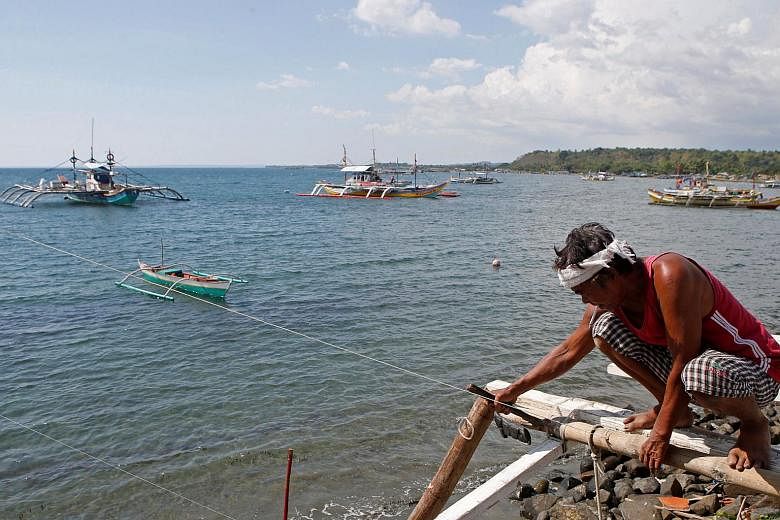In 2008, I received an award from the Rhodes Academy of Ocean Law and Policy and the Onassis Foundation. I was given the Onassis Distinguished Scholar Award for my contributions to peace at sea. In this essay, I wish to share some reflections on our quest for peace at sea.
It may be useful for us to begin by reminding ourselves of the importance of ocean space to humankind. Covering over 70 per cent of the surface of the earth, the sea is indispensable to shipping and international trade. It is a principal source of our food and fuel. It absorbs carbon from the atmosphere and serves as the blue lung of the planet. It is critical to the tourist industry. It is a favourite place for humans to seek rest, recreation and happiness.
Before the advent of the 1982 UN Convention on the Law of the Sea (Unclos), there was a state of legal chaos at sea. Countries used to quarrel and, sometimes, even fight, over the breadth of the territorial sea, fishing rights, and so on. I remember that Iceland and the United Kingdom, for example, had fought a brief war over cod.
It took the Third UN Conference on the Law of the Sea nine arduous years of negotiations to arrive at a consensus on all the previously contentious issues, such as the breadths of the territorial sea and the contiguous zone, the limits of the continental shelf, as well as on some new concepts in international law, such as the exclusive economic zone, archipelagic state, transit passage, archipelagic sealanes passage and the common heritage of mankind.
In sum, Unclos is a comprehensive and authoritative statement of the modern law of the sea. This is why I have called it a Constitution for the world's oceans. The convention has 166 state parties and the European Union. Although the United States is not a party, it recognises the convention as customary international law. It seeks to conform to the convention and expects other countries to do the same.
Unclos promotes peace at sea in three ways. First, by establishing a new, fair and equitable world order for the oceans. Second, by promoting the rule of law. Third, by promoting the peaceful settlement of disputes. The convention has some unique features. It does not allow a state party to make reservations or exceptions. This has, however, not prevented some states from making declarations at the time of their signature, ratification or accession. To the extent that the declarations are not consistent with the convention, they have no legal value. The convention prevails over such declarations.
COMPULSORY DISPUTE SETTLEMENT
The convention has one other unique feature. Under Unclos, dispute settlement is compulsory and not optional and it is an integral part of the convention. When two or more countries have a dispute over the interpretation or application of the convention, they will attempt to resolve the dispute through negotiations. However, if the negotiations are unsuccessful, a party to the dispute may refer the dispute to conciliation, arbitration or adjudication. The convention gives to every state party a choice between arbitration, the International Court of Justice and the International Tribunal for the Law of the Sea.
If a state fails to make a choice, it is deemed to have chosen arbitration. Under Unclos, it is therefore unnecessary for State A to seek State B's consent before referring their dispute to arbitration, assuming that they have both chosen arbitration or are deemed to have done so.
Under Article 298 of the convention, disputes over sea boundaries and military activities are exempted from compulsory dispute settlement. Apart from these two exceptions, all other disputes concerning the interpretation and application of the convention are subject to compulsory dispute settlement. The bottom line is this: It is not permissible for a state which is a party to the convention to opt out of the system of compulsory dispute settlement.
What are the threats to peace at sea?
I can think of the following four threats to peace at sea:
•Piracy and other international crimes against shipping;
•Unfaithful interpretation and application of Unclos;
•Resorting to force or unilateral actions to enforce one's claims or interests instead of relying on the Unclos system of compulsory dispute settlement; and
•Illegal fishing.
Piracy and the armed robbery of ships pose a serious threat to international shipping and to peace at sea. Until a few years ago, the biggest threat to international shipping was posed by Somali pirates. For example, in 2011, out of a total of 439 attacks against ships worldwide, 200 were by Somali pirates. Last year, out of 246 attacks against ships worldwide, none was perpetrated by Somali pirates.
Instead, the largest number of attacks, 108, took place in Indonesian waters. Over half of the attacks, 148, took place in South-east Asia. It is therefore incumbent upon Asean, especially Indonesia, Vietnam and Malaysia, to strengthen their efforts to combat piracy and other international crimes against shipping, in accordance with international law and Unclos. The current situation is a stain on the reputation of Asean.
Another threat to the rule of law is posed by the unfaithful interpretation and application of Unclos. There are many instances of states which have, whether deliberately or otherwise, interpreted and applied Unclos in an incorrect manner. They have made claims and asserted rights and jurisdictions which are not consistent with the convention. Examples include the drawing of straight baselines when it is not appropriate to do so. Other examples include the imposing of compulsory pilotage on ships in transit passage, making excessive claims for rocks and artificial islands, and coastal states claiming rights in the exclusive economic zone which they are not entitled to under the convention. There is a proliferation of excessive claims by coastal states. If this is not challenged, it will undermine the integrity of Unclos and give rise to disputes between states.
The third threat is posed by the behaviour of some states which seem to have rejected the Unclos system of compulsory dispute settlement in favour of acting unilaterally. In the case of maritime disputes, states are obliged to settle their disputes in accordance with international law, including Unclos.
Under Unclos, disputes could be resolved through negotiations, conciliation, arbitration and adjudication. Conciliation is a non-adversarial process and should be appealing to Asians. In addition, parties to a dispute may wish to put aside their competing sovereignty claims and enter into a win-win arrangement to jointly develop the resources in the disputed area and share in their benefits.
Malaysia and Thailand have a joint development in the Gulf of Thailand to extract natural gas from a disputed area, which has been very successful.
My point is that, given goodwill on both sides, there are many ways in which a dispute can be resolved or managed. What is unacceptable is for a country to use force to impose its will or to take unilateral actions to change the facts on the ground and to present the world with a fait accompli.
The UN Food and Agriculture Organisation (FAO) has repeatedly warned us that the world's fisheries are in a state of crisis. The crisis is caused by overfishing, by illegal, unreported and unregulated fishing. It is also caused by the ineffectiveness of the regional fishery management organisations and by the use of destructive and unsustainable methods of fishing.
Subsidies for the fishing industry should be phased out because they have led to overcapacity. The International Maritime Organisation (IMO) should consider requiring all commercial fishing vessels to be licensed and to carry transponders. Regional fishery management organisations should be established in all regions of the world, including the South China Sea, and they should be empowered to make their decisions by majority votes, if necessary. Certain highly destructive methods of fishing should be banned. The FAO's code of conduct for responsible fisheries should be strengthened. We should support the efforts of Indonesia to enforce its laws against illegal fishermen in its exclusive economic zone.
The quest for peace at sea is an achievable one, provided we are prepared to do the following three things.
First, we should all uphold the rule of law. This means abiding by international law, including Unclos and the IMO Conventions.
Second, we should agree to settle our differences peacefully and in accordance with recognised international diplomatic and legal processes.
Third, we need political will and a spirit of give and take. Without political will, nothing can be resolved. With political will, every problem, including the disputes in the South China Sea, can be resolved.
•The writer is former president of the Third UN Conference on the Law of the Sea and chairman, governing board, Centre for International Law, National University of Singapore


